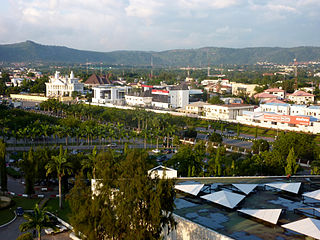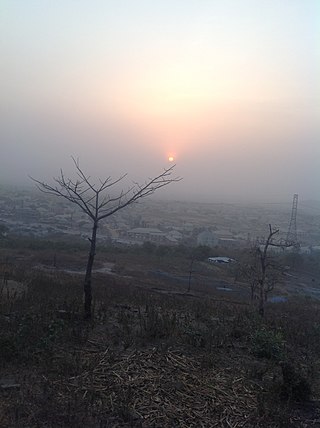
Abuja is the capital and sixth most populous city of Nigeria. Situated in the middle of the country within the Federal Capital Territory (FCT), it is a planned city built mainly in the 1980s based on a master plan by International Planning Associates (IPA), a consortium of three American planning and architecture firms made up of Wallace, Roberts, McHarg & Todd as the lead, Archi systems International, and Planning Research Corporation. The Central Business District of Abuja was designed by Japanese architect Kenzo Tange. It replaced Lagos, the country's most populous city, as the capital on 12 December 1991.

Niger is a state in the North Central region of Nigeria. It is the largest state in the country by area. The state capital is Minna. Other major cities are Bida, Kontagora and Suleja. Niger state was formed in 1976 when the then North-Western State was divided into Niger State and Sokoto State. It is home state of two former Nigerian military heads of state— Ibrahim Babangida and Abdulsalami Abubakar. The Nupe,Adara, Gbagyi, Kamuku, Kambari, Gungawa, Hun-Saare, Hausa and Koro form the majority of numerous indigenous tribes of Niger State.

Nasarawa State is a state in the North Central region of Nigeria, bordered to the east by the states of Taraba and Plateau, to the north by Kaduna State, to the south by the states of Benue and Kogi, and to the west by the Federal Capital Territory. Named for the historic Nasarawa Emirate, the state was formed from the west of Plateau State on 1 October 1996. The state has thirteen local government areas and its capital is Lafia, located in the east of the state, while a key economic centre of the state is the Karu Urban Area—suburbs of Abuja—along the western border with the FCT.

The Aso Villa is the workplace and official residence of the President of Nigeria since 1991, when Nigeria moved its capital from Lagos to Abuja. It is located at Yakubu Gowon Crescent, The Three Arms Zone, Asokoro, Abuja, FCT, Nigeria. Several names that are used for Aso Villa include: State House, The Rock and The Villa. The Aso Rock Villa is the most protected presidential state house in Africa. The Villa hosts the offices of the President and Vice President and it is the seat of power of the Federal Government of Nigeria. It is heavily protected by the Presidential Guard Brigade (Nigeria) and the State Security Service (Nigeria).
Julius Berger is a Nigerian construction company, headquartered in Abuja, with additional permanent locations in Lagos and Uyo.

Zuma Rock is a large natural monolith, or inselberg, an igneous intrusion composed of gabbro and granodiorite, located in Madalla, a town in Niger State, Nigeria. It is situated in the west of Nigeria's capital, Abuja, along the main road from Abuja to Kaduna, off Madalla, and is sometimes referred to as the "Gateway to Abuja from Suleja". Zuma Rock rises approx. 300 metres (980 ft) above its surroundings. It was once thought to be in the Federal Capital Territory but is actually located at the upper end of Madalla, a rural settlement in Suleja Local Government Area of Niger State.

Maitama is a district in Phase 1 of Abuja, the capital city of Nigeria. The district hosts various foreign embassies, high commissions, and governmental buildings. It houses several of Abuja's most well known landmarks, such as the Millennium Park, Minister's Hill, the Unity Fountain, the IBB Golf Club, and the Transcorp Hilton.

Keffi Local Government Area and a traditional and commercial town in Nasarawa State, north central Nigeria. Its headquarters are in the town of Keffi. Keffi is 50 kilometers from Abuja. Nasarawa State university is located along the Keffi-Akwanga expressway.

Bwari is a local government area in the Federal Capital Territory in Nigeria. The original inhabitants of the town are the Gbagyi speaking people. The paramount ruler is the Esu who is otherwise known as Sa-bwaya. However, with the establishment of FCT in Abuja so many changes occurred; such changes include the turbaning of late Musa Ijakoro as District Head of Bwari in 1976, and his elevation as Sarki of Bwari to the position of a second class status in 1997 by the Ministry of the Federal Capital Territory under the then minister, General Jeremiah Useni.

Hamza Abdullahi was a Nigerian statesman and military administrator who served as Governor of Kano State from 1984 to 1985; and Minister of the Federal Capital Territory from 1986 to 1989.
Masaka is a town in Nasarawa, central Nigeria. It is a district of Karu Local Government Area, Nasarawa State and is among the towns that forms the Karu urban area, a conurbation of towns under Karu Local Government Area of Nasarawa State. The neighbouring towns to Masaka, also in this urban area as a result of their merger following a population explosion in the zone, are:
The Karu Urban Area is an urban area in central Nigeria. The urban area is majorly located in the Nigerian state of Nasarawa, but with some parts stretching into the boundaries of the Federal Capital Territory (FCT). It has an area of 40,000 hectares (400 km2) and a population of some 2 million.

Abuja Investments Company Limited (AICL) is a Nigerian development and investment company for the Federal Capital Territory Administration (FCTA), based in the city of Abuja. It provides investments for economic development for the Federal Capital Territory region in Nigeria.

Kubwa is a residential district in Bwari, one of the local government areas in the Federal Capital Territory in Nigeria. It is one of the major suburbs within the metropolitan area of Abuja.
Lokogoma is a residential area of Abuja, the capital city of Nigeria. It is 30 minutes from the Nnamdi Azikiwe International Airport and 25 minutes from the city centre and It is still in development.

The World Trade Centre is a complex of eight buildings under construction in the Central Business District of Abuja, FCT in Nigeria. There are seven skyscrapers planned for the site, two of which have already been topped out, with the others either under construction or at various stages of development. At 110 m (361 ft), the 24-floor WTC Tower 1, which topped out in 2015 was briefly the tallest residential building in Nigeria, while WTC Tower 2 is the tallest building in Abuja, standing at 120 m (394 ft). Initially scheduled to be opened in 2013, the World Trade Centre Abuja is now scheduled to open in 2016.

The Presidential Guards Brigade is an elite brigade of the Nigerian Army responsible for protecting the President of Nigeria. The members of the brigade are a group of Nigerian soldiers who guard the residence of the President and his guests, as well as perform ceremonial duties. Also referred to as the Brigade of Guards, this unit, according to AllAfrica with reference to a senior army official, "does not answer to Army Headquarters or to the Chief of Army Staff in any operational matters and its commander is completely integrated into the President's security team."

New Karshi is a town in Karu Local Government Area of Nasarawa State, Nigeria, founded in the 1980s by Muhammadu Bako II. It is a semi-autonomous local government created out of Karu LGA as Karshi Development area with the administrative secretariat in Uke. Karshi has a local government chairman as its administrative head and a seat in the Nasarawa State House of Assembly. Emir of Karshi Emirate, Alhaji (Dr) Muhammadu Sani Bako III, a first class chief is the traditional head of New Karshi. It has a population of about 30,000 people. The predominant tribes are Gwandara, Gbagyi, Gade, Bassa and Hausa.
Gwarimpa Estate is a developed district situated in Phase 3, in the capital city of Nigeria, Abuja. It is the largest single housing estate in Nigeria and in West Africa. The mega housing estate consist of some of the most elegant architectural designs with good roads networks and expensive houses.
The Bauchi Ring Road is a circular thoroughfare encircling the city of Jos in Plateau State, Nigeria.



















